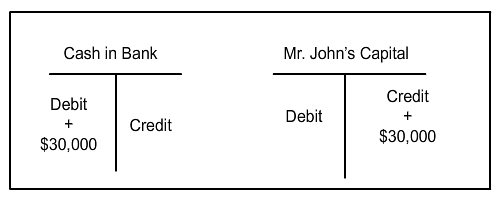Journalizing a Business Transaction – Example 1
Consider the following example to help clarify the steps to journalize a business transaction.
On Jan 1st, Mr. John introduced a capital of $30,000 from his own money and deposited it in the bank.
Step 1: Analysis:
The accounts affected in the transaction are:
- Cash in Bank account
- Mr. John’s Capital account
- Cash in Bank is an Asset account
- Mr. John’s Capital is an Owner’s Equity account
- Cash in Bank increases by $30,000
- Mr. John’s Capital increases by $30,000
Step 2: Debit – Credit Rule:
- Increase in the Asset account is recorded as debit. Debit the Cash in Bank Account for $30,000.
- Increase in the Owner’s Equity is recorded as credit. Credit Mr. John’s Capital account for $30,000.
Step 3: Prepare a T Account:

Step 4: Pass a Journal Entry:
Date |
Account Title |
Debit |
Credit |
Jan 1 |
Cash in Bank |
$30,000 |
|
|
Mr. John’s Capital |
|
$30,000 |
|
Memorandum No. 1 |
|
|